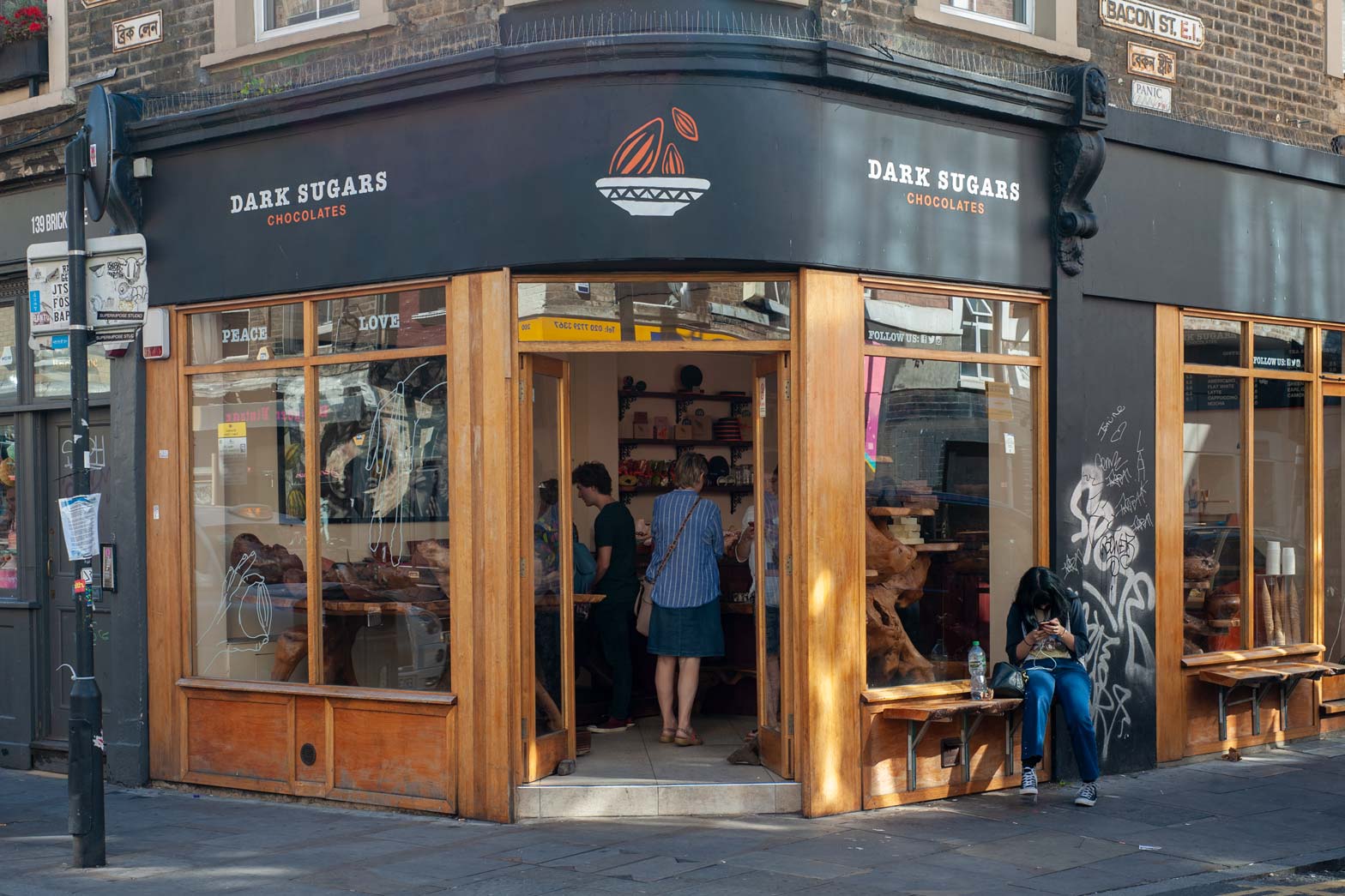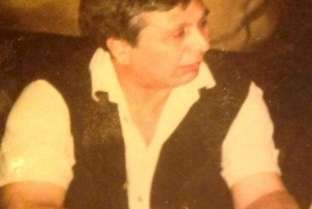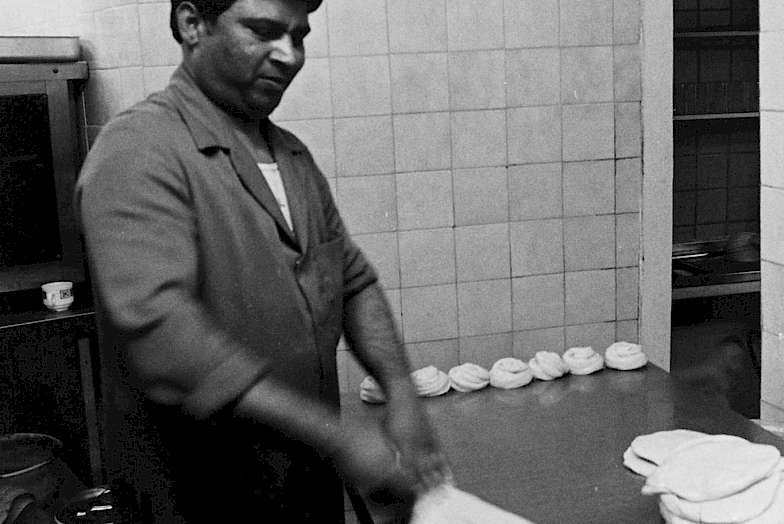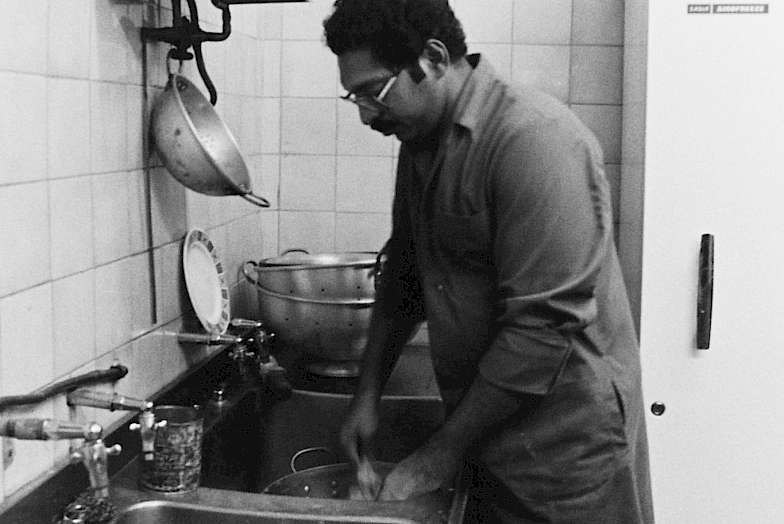Dark Sugars
Dark Sugars has two shops on Brick Lane. The building in which this branch of Dark Sugars is located is steeped in Brick Lane’s curry house history, as it was once home to the lane’s oldest and most famous ‘Indian’ restaurant, The Famous Clifton.
Dark Sugars originally started out selling luxury chocolate truffles at stalls in Spitalfields and Borough markets. The first branch of Dark Sugars opened in Brick Lane in 2013 and the second in 2015.
Both sites sell hundreds of handmade chocolate and cacao products from cocoa beans sourced at the co-owner’s family farm in Ghana. Staff often offer passers-by free samples of their chocolate products to try before they buy.
Stepping back in time: The Famous Clifton
Dark Sugars was once the site of The Famous Clifton restaurant. It was owned by Musa Patel, who was born in Karachi, Pakistan in 1936. Musa, who owned several other restaurants, cafés and shops on Brick Lane, as well as a Chinese restaurant in Ludgate Hill, was well known in the area. One former restaurateur said:
‘I knew Musa Patel from the beginning because Musa Patel used to know every single Bengali who was involved in Brick Lane politics or any kind of association to Brick Lane. He used to know everybody, and everybody used to know him.’
A current restaurateur, who grew up in Brick Lane, simply said:
‘Musa Patel was a legend.’
Musa originally opened a café called The Clifton on this site in 1959, which served food to a clientele of mostly single, working, Bangladeshi men. The café was named after an affluent, beachside suburb in Karachi, Pakistan.
In 1967 Musa transformed The Clifton into Brick Lane’s first licensed restaurant, later renamed The Famous Clifton. The restaurant served a pan-Indian cuisine to a growing English and South Asian clientele. Kitchen and front of house staff at The Famous Clifton came from a diverse range of backgrounds, hailing from different parts of the Indian subcontinent. One of the restaurant’s former waiters recalls:
‘There was Mauritius people, South Indian people, Indian people, Pakistani people, and Gujarati people. It was mixed.’
The first head chefs at The Famous Clifton were of Keralan and Punjabi descent. One Brick Lane resident, whose Keralan father was specifically recruited to work as the head chef at the Indian High Commission and who later worked in the East End restaurant trade, said:
‘Kerala chefs have a great reputation.’
He added:
‘there's at least three or four chefs that I can think who all worked in Musa's places. They were all from Kerala, you know.’
The Famous Clifton was the first restaurant on Brick Lane to use a Tandoor (tandoori oven) for cooking. The restaurant was well known for its traditional biryanis and ‘big-pot’ cooking style. Recalling the cooking technique employed at The Famous Clifton, one former Brick Lane restaurateur told us:
‘it's all in a big pot, stirred by the chef.’
Many locals would argue that the opening of The Famous Clifton marked a shift in the development of the ‘Indian’ restaurant trade on Brick Lane. Its presence marked a departure from the lane’s Bengali-style cafés, which served a limited range of snacks and home-style dishes to a predominantly local Bangladeshi clientele. The Famous Clifton attracted customers from outside the area and offered them a dining experience complete with Bollywood music and colourful murals of Bollywood heroines lining the walls. Reflecting on the opening of The Famous Clifton, one Brick Lane resident told us:
‘from my point of view, that’s when things began to change a little bit. So, then other people [restaurateurs] decided, okay, yeah, white people want to come here too’.
Another local community worker said of the clientele in later years at The Famous Clifton,
‘There were very few Bengalis going to Clifton. I think Clifton had a wide clientele. So, they had white people, they had lots of Asians … so Indian and Pakistanis.’
Soon, the restaurant became a well-known Brick Lane dining spot. Its former head chef, now in his eighties, said of The Famous Clifton:
‘Yes, very famous. Very, very famous. Everybody come out – West End, East End, Southall. Everybody comes there.’
Reflecting on his time working at The Famous Clifton, one former waiter said:
‘The atmosphere was nice because it was busy all the time. It was busy and vibrant and it was, like, everyone used to enjoy the work. Everyone enjoyed it.’
He continued:
‘The Famous Clifton – it was licensed and we had all this trade. It was good. All the people used to come. They used to spend like mad, I'm telling you.’
Another former Brick Lane restaurateur made similar remarks:
‘It was the best place to come for a celebration, for taking somebody out, in London, because there wasn’t any other establishment which generated this kind of fame and name. And the level of food, I mean, was good, biryani was very famous, chapati, this, that, he used to do kebabs and so on.’
The restaurant attracted a number of well-known diners, including two future prime ministers of Pakistan, Benazir Bhutto and Imran Khan, notorious East End gangsters the Kray Twins, Richard and David Attenborough, and the cast of popular soap opera EastEnders. In its early years, the basement of the restaurant operated as a gambling den, often frequented by the Krays and their associates.
Many of those who worked under the direction of The Famous Clifton’s head chefs, as well as kitchen staff, went on open their own ‘curry’ restaurants on Brick Lane. One former waiter (and occasional chef) is the current owner of The Monsoon, while another former employee is co-owner of Moon Light. Other former Famous Clifton employees opened Punjabi-style restaurants in Whitechapel, including the fashionable Tayyabs.
After The Famous Clifton closed its doors soon after the founder’s death, another curry house, Preem & Prithi Balti House, opened on the same site under new ownership. Later, the space changed hands again and emerged as the home of Dark Sugars.



